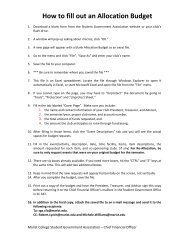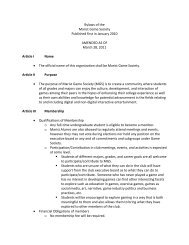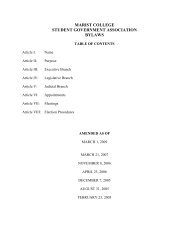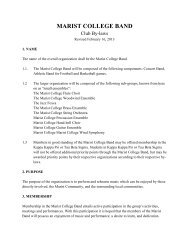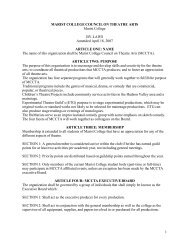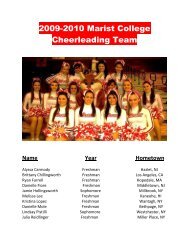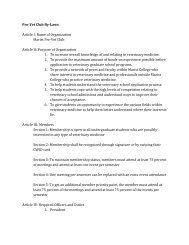GENERATOR
October 2010 - Marist Clubs and Organizations - Marist College
October 2010 - Marist Clubs and Organizations - Marist College
- No tags were found...
You also want an ePaper? Increase the reach of your titles
YUMPU automatically turns print PDFs into web optimized ePapers that Google loves.
FREEGANISM<br />
By Monica Speranza<br />
Some who have heard of freeganism may<br />
picture a bum, dumpster diving for dayold<br />
bagels and discarded bruised produce.<br />
Others may recall the Seinfeld episode in<br />
which Elaine’s homeless boyfriend takes<br />
her to an alley behind a bakery, finds<br />
doughnuts in the trash and tells her “You<br />
know, Elaine, you are the bear claw in the<br />
garbage can of my life.” These images are<br />
not inaccurate.<br />
Freeganism can be defined at its most<br />
basic level as a way to cut down on waste<br />
and save money by taking and using other<br />
people’s cast-offs for free. Though the<br />
concepts of dumpster-diving and digging<br />
through trash for food are large parts of<br />
freeganism, in many cases it is a much<br />
larger picture. Some other items “freegans”<br />
salvage besides food include; furniture,<br />
appliances, technological devices, and<br />
clothes. One freegan blogger from<br />
community.livejournal.com/freegans wrote<br />
that she and two other people had found “a<br />
practically new copy machine (instructions<br />
and everything!), a tiny portable television,<br />
a small TV, a perfectly good white plastic<br />
high chair, a waffle iron, a 5-disc cd player”<br />
and several other items during a dumpster<br />
dive.<br />
“For me, an individual who practices<br />
‘freeganism’ represents one who is<br />
committed to living a lifestyle that<br />
minimally impacts the world around<br />
them,” Steve Sansola, Marist Recycling<br />
Chair, said.<br />
According to the United<br />
States Census Bureau,<br />
as of 2008 39.8 million<br />
people in the United States<br />
lived below the poverty<br />
line. The 2008 municipal<br />
solid waste statistics<br />
according to the EPA<br />
break down as follows:<br />
31% paper, 13.2% yard<br />
trimmings, 12.7% food<br />
scraps, 12% plastics, 8.4%<br />
metals, 7.9% rubbers,<br />
leathers, and textiles, 6.6% wood, 4.9%<br />
glass, and 3.3% other. Considering that<br />
much of an average person’s waste includes<br />
items that are damaged but not completely<br />
useless (e.g. wilted lettuce, a torn jacket, a<br />
chipped coffee mug), it is not implausible<br />
to think that, by practicing freeganism the<br />
number of people living below the poverty<br />
line could decrease.<br />
It is difficult to pinpoint when the<br />
freeganism movement began. Various<br />
websites attest that freeganism emerged<br />
in the 1960s, while Jan Goodwin of Marie<br />
Claire claimed it had been coined in the<br />
’90s when she wrote, “She Lives Off What<br />
We Throw Away.” Jake Halpern of The<br />
New York Times wrote in the article, “The<br />
Freegan Establishment” that the freeganism<br />
concept originated in the seventeenth<br />
century. In any case, it is accepted that the<br />
idea of freeganism began as a vegan/anticapitalist/environmentalist<br />
hybrid. The<br />
idea was to utilize and survive on what<br />
the average person wastes and ultimately,<br />
refuse to contribute to the capitalist system<br />
by not buying food and other necessities.<br />
Nowadays, it is common for people to<br />
choose to participate in partial freeganism<br />
(only taking certain items, like food) or<br />
total freeganism (getting most everything<br />
from others’ cast offs) as an alternative<br />
lifestyle to simply cut cost of living and/or<br />
contribute to saving the planet.<br />
“While I am in favor of any effort to<br />
reduce our need to purchase and consume<br />
unnecessary items,” Sansola said, “I do<br />
not believe this lifestyle is a practical and<br />
realistic way of life. It may be possible<br />
for an individual to live this lifestyle for<br />
a brief time, but as one extends his/her<br />
responsibilities, both in the work place<br />
or with family, this approach becomes<br />
problematic and unrealistic.”<br />
Though practices like dumpster diving<br />
and picking through other people’s trash<br />
is dirty and smelly, freegans make sure<br />
to keep the practice sanitary. Many wear<br />
gloves when they go through trash and they<br />
thoroughly wash and sanitize what they<br />
take. They are usually very considerate<br />
of the place they take from by not leaving<br />
behind a mess, being discreet, and<br />
sometimes even building up a rapport with<br />
the owners of the places they take from. In<br />
the YouTube video “First Time Freegans,”<br />
a young British woman describing her<br />
experience says: “I think the part about,<br />
like, making friends with the security<br />
[guards] or making friends with the shop<br />
people is very important.”<br />
The lesson, so to speak, that freeganism<br />
teaches is to be more conscientious of<br />
what and how much one wastes. What is<br />
ironic, as Halpern points out in his article,<br />
is that living off other people’s waste is<br />
what freeganism is, so if society becomes<br />
increasingly less wasteful, it is possible<br />
that freeganism will become obsolete. Be<br />
that as it may, there are other factors aside<br />
from inherent wastefulness preventing<br />
freeganism from dying out. For example,<br />
there are several items that seem recyclable<br />
- rubber, plastic toys, plastic kiddie pools—<br />
but are not recyclable.<br />
Many freegans are eager to pass on<br />
their knowledge about how to participate<br />
in freeganism. There are several blogs<br />
and YouTube videos with instructions and<br />
advice on how to get going if you have<br />
never done it before. Type in “freegan”<br />
on YouTube or “freegan blog” on a search<br />
engine.<br />
6



